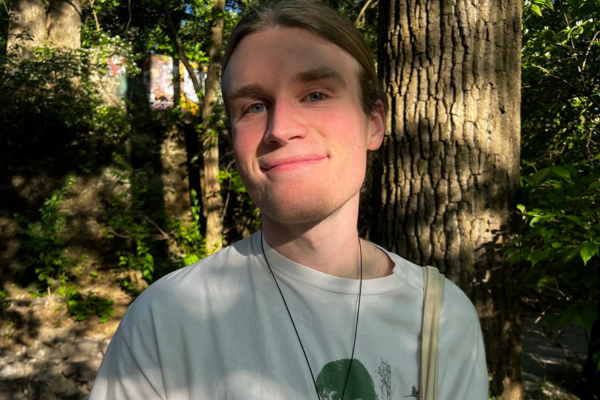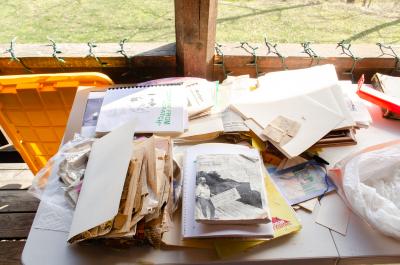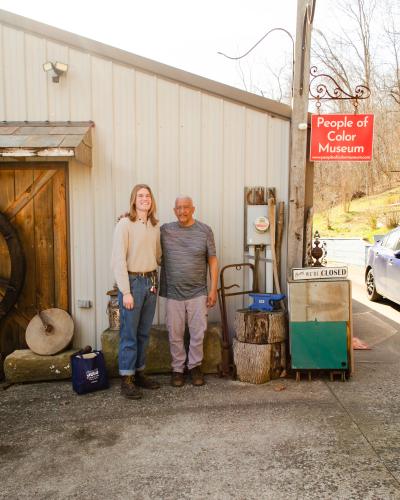Research and Representation: Blaise Reader’s Commitment to Appalachia

When Blaise Reader began their English degree, they knew they wanted to use their studies in service of their community in Appalachia — that desire hasn’t wavered. Their method, however, has changed significantly, and it all began with a single paper. While they came to Ohio State intending to go into secondary education, their experience in an early class, Introduction to Folklore, showed them the ways research can be transformative for both individuals and communities. As they completed their first ethnographic research assignment, their initial desire shifted into a new academic path, soon culminating in a full thesis, that explores how research can be both inquiry and service to communities.
Reader’s research centers on the various roles Appalachian local history museums play within “[their] environment, [their] community, and then the broader world.” Museums function as not only a historical record for the community, but also as a space for outsiders to investigate a history different from their own, and Reader says that “thinking a lot about representation is where all this came out of.” They hope their thesis will highlight the way Appalachian museums preserve the diversity of the region and continue to challenge stereotypes and reductive histories: how oral histories function in museums, how curatorial practices shape those oral histories, and how material culture influences narrative.

Reader’s thesis solidified last spring during their time in the Ohio Field School, a program through the Center for Folklore Studies that immerses students in research with community partners in Southeast Ohio. When they were assigned to the Tablertown People of Color Museum, they were “enamored by the story that the museum was telling.” During that semester, they worked within the museum archives, documenting the artifacts of a local matriarch who was known for her recipes and her storytelling.
The goals of Reader’s thesis go beyond the typical practices of consolidating and analyzing data and information. For them, research can follow a community-based model, using their academic and institutional resources to fulfill the community’s needs, such as the preservation of documents and history. “I think the point of the thesis isn't digging up information and analyzing, but rather the service," they point out. The labor of going through all the "dusty, falling-apart recipes, writings, short stories and journal entries" was a transformative part of their research journey. "It felt like so much more than research," they reflect. "It felt like I was affecting people and making change."
Reader is also grateful for the various mentors who made their work possible. One of their first mentors on this project was Jasper Waugh-Quasebarth (previously of Ohio State’s Department of Comparative Studies, now at Old Dominion University), who taught that pivotal Introduction to Folklore and first advised their project. As they continue their research, they recall how he prepared students for field work with discussions about ethics, focusing on how “folklore stems from anthropology, a field that has been historically very colonial and extractive.” They also note how Waugh-Quasebarth reminded students of the sacrifices people make for their research to be possible, telling them that “time is the most important thing anyone has and that's something you need to be deeply respective of when doing this research. People give you their leisure time away from work and instead of spending time with their families or doing anything else.”

Currently, Reader is working with Professor Dorothy Noyes and museum curator David Butcher from the Tablertown People of Color Museum. Their methodology and writing have also been deeply influenced by Professors Katey Borland and Merrill Kaplan from taking their folklore courses. The “fresh perspectives” offered by their various advisors have been essential to the development of their thesis in a variety of ways. Professor Noyes has played a large role in encouraging them to “think really critically about writing and what it's doing.” In Folklore II, Professor Kaplan encouraged them to break out of their comfort zone and explore folklore beyond what they were familiar with. Connecting with David Butcher through the Ohio Field school offered a personal connection to the research; Reader remarks, “it means a lot that he does see that there's purpose to this. There's purpose in the preservation and thinking critically about what the museum's doing.”
Entering the final semester of their undergraduate degree, Reader is planning on remaining in Columbus but intends to continue visiting their hometown and to continue their research on Appalachia. With the long-term goal of going on to graduate studies and potentially becoming a professor, Reader works to carry the attitude of service and representation into all their academic and career pursuits. From Introduction to Folklore to their thesis and beyond, service is at the heart of their academic and personal relationship to Appalachia; “that's what really drove me into the project and got me feeling so passionate about it.” Even though their academic journey has taken them away from their home region, it remains close to their heart. They say, “I’m still thinking about the region from outside of it, because the point is to service it.”
